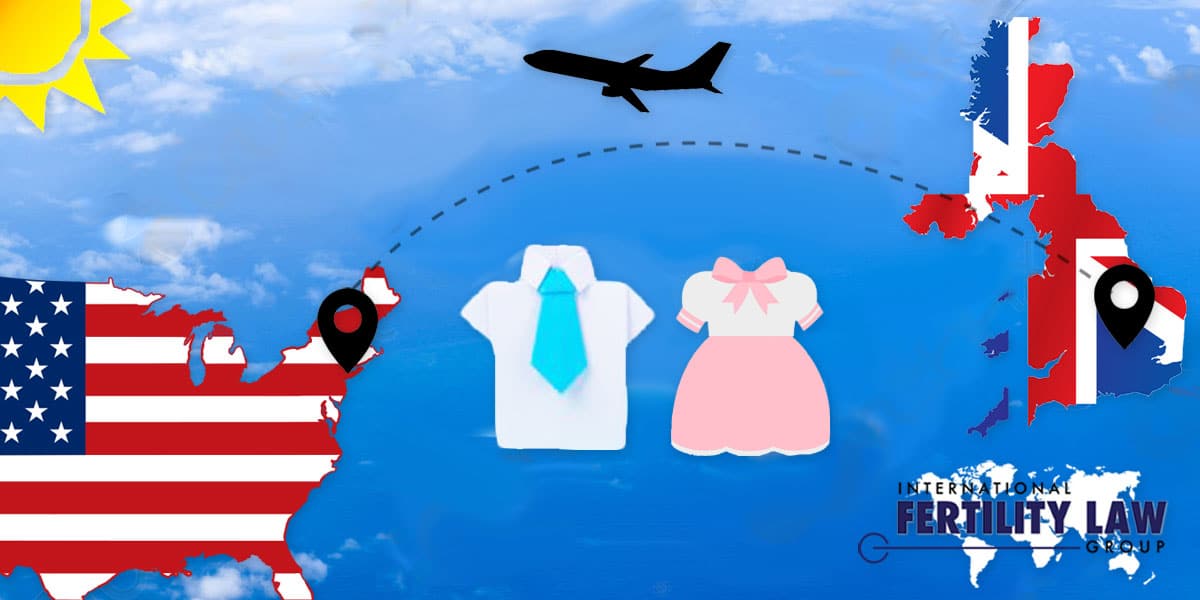
02 Dec 2020 U.K. Ends Ban on Egg, Sperm Export for Surrogacy in U.S.
The path to parenthood just got a little smoother for U.K. intended parents planning surrogacy in the United States: The U.K. agency regulating assisted reproduction has agreed to overturn a rule that essentially prevented U.K. residents from shipping their eggs, sperm or embryos to the U.S. for surrogacy.
As our colleague, U.K. assisted reproductive technology (ART) attorney Natalie Gamble, reported recently, the Human Fertilisation and Embryology Authority (HFEA), which regulates fertility services in the U.K., previously interpreted the law to forbid U.K. fertility clinics from exporting intended parents’ genetic materials unless they could ascertain that the material would not be used in so-called “commercial” surrogacy in the U.S. or another country.
Until recently, U.K. intended parents were able to work around this prohibitive rule by simply traveling to the U.S. for fertility treatments such as egg or sperm donation and in vitro fertilization.
U.K. Intended Parents Face COVID-19 Travel Ban
As Gamble wrote, “Of course, since February, the Presidential travel ban has prevented intended parents from travelling in person, and so the HFEA's stance on export has effectively blocked U.S. surrogacy for many U.K. intended parents.” (See our latest COVID-19 travel update for international intended parents.)
Gamble’s firm, NGA Law, and surrogacy agency Brilliant Beginnings successfully challenged the HFEA on its interpretation of U.K. law. She writes:
“The Chief Executive of the HFEA Peter Thompson has now confirmed to us in writing that the HFEA accepts that its previous interpretation of the law was wrong. It plans to update its guidance and confirm explicitly that U.K. fertility clinics can export for international surrogacy, irrespective of any commercial element. Going forwards, U.K. fertility clinics will be able arrange export of sperm, eggs or embryos form the U.K. to the U.S. just by liaising with the overseas clinic to ensure it meets the necessary safety standards, etcetera; they no longer need to ask about the detail of surrogacy plans or payments to surrogates and agencies.”
Gamble said the rule change is intended to be immediate, although updates to the written guidelines may take some time.
Restrictive Laws Result in U.K. Surrogate Shortage
As we wrote last year, under existing laws, enacted in the mid-1980s, only “altruistic” or uncompensated surrogacy is legal in the U.K.—although the guidelines for what is considered allowable compensation for expenses are unclear—and surrogacy agreements are not enforceable in court. In addition, a surrogate who gives birth in the U.K., and her spouse, if applicable—not the intended parents—are the legal parents of the baby. Intended parents must establish parentage through a court procedure, which cannot be undertaken until the baby is six weeks old and can take as long as a year to finalize.
U.K. law also prohibits surrogacy agencies from advertising and from making a profit.
The onerous legal restrictions have had a chilling effect on surrogacy in the U.K. With only a handful of non-profit agencies to facilitate surrogacies, limited compensation and unenforceability of surrogacy agreements, there are not enough U.K. surrogates to meet demand.
That shortage and the legal hurdles to establishing parentage have resulted in hundreds of U.K. intended parents seeking surrogacy in other countries. The United States, with its generally favorable surrogacy laws, generous supply of surrogates, leading-edge reproductive healthcare services, and clear parental establishment procedures, has become a popular destination for U.K. intended parents.
Although there are no definite figures on the number of U.K. residents who have had babies via surrogacy in the U.S., a 2018 study of 200 intended parents, co-authored by Gamble, found that nearly all (97 percent) of those choosing surrogacy in the U.S. did so “to access a better legal framework, which includes being recognised as the legal parents of the child from birth.”
U.K. Considers Outdated Fertility Law Reform
The U.K. appears to be on a path to reform its outdated surrogacy and assisted reproduction laws. As we reported, in June 2019, the U.K. Law Commission, which reviews outdated laws, has made initial recommendations, including establishing intended parents as legal parents from birth; regulation of surrogacy arrangements and best practices; and U.K. recognition of international surrogacy arrangements, on a country-by-country basis.
Today, with a COVID-19 vaccine finally on the horizon, our hopes are high that travel between the U.K. and the U.S. will return to normal in the coming months. The news of this latest rule change will do so much to ease the burden of intended parents planning surrogacy in the U.S. during the global pandemic. Thanks to the dedication and hard work of Natalie Gamble and other advocates, we are optimistic that much-needed reforms to U.K. surrogacy law will follow soon.

















